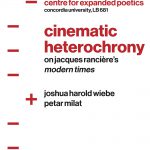The work of Jacques Rancière – from The Nights of Labour until the more recent Béla Tarr, the Time After – can be seen as the work of constantly displacing and resettling various forms and constraints of time. In the beginning, it was the question of the structural lack of time of those whose “work does not wait”, who needed to steal it from the night to redouble their lives as writers and poets. Rancière’s immersion in workers’ archives in 1987 went through The Ignorant Schoolmaster episode: the disruption of a linear vision of pedagogical chronometer where there is always one “before and after” (the ignorance) to whom Rancière opposed “any moment and any time” from which the learning starts and continues. It resulted later in the problematisation of procedures of constructing historical objects and meanings (The Names of History), and, around 1989, the author of On the Shores of Politics analysed proclamations of an end or a beginning of time and its political consequences. From the mid 1990s onward, the problem of temporality will lead him to research regimes of artistic historicities, and to an exploration of time as presented in the works of modern literature and cinema. As if writers and film-makers had much more to say about time than historians or philosophers.
Modern Times – written by Rancière originally in English – is made of four texts, three of which have their origin in lectures given in several parts of ex-Yugoslavia at the invitation of Edicija Jugoslavija (Brussels/Belgrade) and Multimedia Institute (Zagreb). The texts successively deal with politics, artistic modernity, dance and cinema. Modern Times is a volume in which Rancière presents his general reflection on time in a systematic and synthetic manner, while also pointing towards a common time or moments of emancipation.
Joshua Wiebe (Centre for Expanded Poetics) and Petar Milat (Multimedia Institute) will discuss the status of cinema in Ranciere’s most recent publications and its relevance to film studies.

